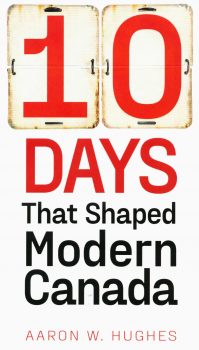Thursday, August 6, 1981 was a day to remember. At 11 am Eastern the Bank of Canada raised the prime rate to 21 percent. The country had a million unemployed for the first time since the Dustbowl. Farmers and small business owners had a hunted look. Mortgage and trust companies collapsed, 17 of them, and then the banks.
No one who survived the summer of ’81 ever forgot it. “Scarring,” the economists call it now. At a 2017 hearing of the Commons agriculture committee, members were chattily debating farm debt when an oldtimer, then-MP Bev Shipley (Lambton-Kent, Ont.), spoke up. “I remember the 1980s,” he said. The room froze.
Author Aaron Hughes’ 10 Days That Shaped Modern Canada omits that date to remember. Hughes acknowledges his work is necessarily subjective. Hughes’ favourite dates are neither mine nor yours. That is not the point.
“Not all days are created equal,” writes Hughes. “While the vast majority of days ebb and flow in a repetitive fashion, some become singularly momentous to a nation’s formation and outlook that, although their importance is recognized at the time, the true significance becomes apparent only after the fact.”
Memory is selective and intimate. It rarely travels well. In 1927 Maclean’s magazine asked readers, “Who is the greatest living Canadian?” The top response was Charles Saunders. Find the Maclean’s editor today who could identify Saunders (a plant geneticist) or recall what he did (developed Marquis Wheat that made Canada a global food exporter).
Hughes is a professor of humanities at the University of Rochester. He has not lived in Canada in ten years. “I have had to listen to Americans talk about themselves,” he writes.
“In all of these conversations I frequently find my eyes glazing over while asking myself questions like: What does it mean to be a Canadian?” he writes. “What dates and events have shaped us as a nation?” 10 Days is quirky and compelling. It is excellent book club material. It is a good way to start a fight.
Hughes’ Top Ten list includes bizarre entries. He cites July 21, 1988, “the day the Multiculturalism Act was signed into law” (!) and August 6, 2016, “the day of The Tragically Hip’s last concert” (!!)
He omits the January 1, 1989 enactment of the North American Free Trade Agreement that cost 495,000 factory jobs. He makes no mention of the October 26, 1992 Charlottetown Accord referendum, “a defeat for the elites of this country,” said Izzy Asper, then-chair of CanWest Global Broadcasting Corp.
Professor Hughes’ memory, like each of ours, is his own creation. “This vision is largely liberal, progressive, anglophone and centralist,” he writes. “As universal as it may seem however, it is nonetheless important to realize it is by definition also particular.”
“Just as the book was going to press a large truck convoy rolled into Ottawa and blocked some border crossings with the United States protesting Covid-19 vaccine mandates and restrictions,” writes Hughes. “The convoy and its protests ended after Prime Minister Justin Trudeau temporarily invoked the Emergencies Act thereby suspending the rights of citizens to free movement or assembly. Clearly modern Canada is still in the process of being shaped.”
By Holly Doan
10 Days That Shaped Modern Canada by Aaron W. Hughes; University of Alberta Press; 288 pages; ISBN 978-177212-6327; $27.99






